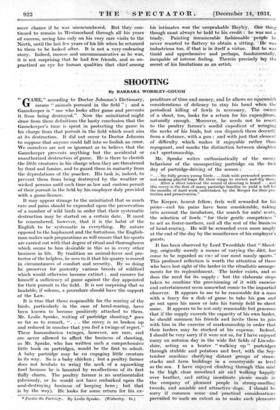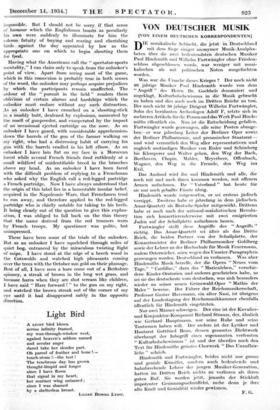SHOOTING
By BARBARA WORSLEY-GOUGH
•
GAKE," according to Doctor Johnson's Dictionary, means " animals pursued in, the field " ; and a Gamekeeper is " one who looks after game and prevents it_ from being destroyed." Now the uninitiated might draw from these definitions the haity conclusion that the Gamekeeper's time is spent in protecting the game in his charge from that pursuit in the field which must aim at its destruction. It did not occur to Doctor Johnson to suppose that anyone could fall into so foolish an error. We ourselves arc not so ignorant as to believe that the Gamekeeper prevents anything but the accidental or unauthorized destruction of game. He is there to cherish the little creatures in his charge when they are threatened by flood and famine, and to guard them in maturity from the depredations of the poacher. His task is, indeed, to prevent them from being destroyed by the weather or wicked persons until such time as law and custom permit of their pursuit in the field by his employer duly provided with a game-licence.
It may appear strange to the uninitiated that so much care and pains should be expended upon the preservation of a number of wild birds in order that their systematic destruction may be started on a certain date. It must. be remembered, however, that it , is the habit of the English to be systematic in everything. By nature opposed to the haphazard and the fortuitous, the English- man makes such preparations as will ensure that his sports are carried out with that degree of ritual and thoroughness which seems to him desirable in this as in every other business in life. By tradition an animal-lover and pro- tector of the helpless, he seesto it that his quarry is reared in circumstances of comfort and security. _ By, so doing he preserves for posterity various breeds of wildfowl which would otherwise become. extinct ; and ensures for, himself a sufficiency- of game against the day appointed for their pursuit, in the field. It is not surprising that so laudable, if solemn, a procedure should haye the support of the Law.
It is true that those responsible for the rearing of the birds, particularly in the case of hand-rearing, have been known to become positively, attached to them. Mr. Leslie Sprake, writing of partridge shooting,* goes so far as to remark, " . . the covey -is so _ broken up and reduced in number that you feel a twinge of regret." These humanitarian twinges, however, are rare, and are never allowed to affect the business of shooting, as Mr. Sprake, who has written such a comprehensive little book on partridges, would be the first to admit. A baby partridge may be an engaging little creature in its way. So is a baby chicken ; but a poultry, farmer does not hesitate to wring the neck of a squawking fowl because he is haunted by recollections of its first fluffy charm. The poultry farmer is no sentimentalist (obviously, or he would not have, embarked upon the soul-destroying business of keeping hens ; but that is by the way).. He looks for some return for his, ex- * Perdix the Partriciv. - By Leslie Sprake. (Witherby. 6s.) penditure of time and money,,and he allows no squeamish considerations of delicacy to stay his hand when the periodical killing of fowls is necessary. The own- er of a shoot, too, looks for a return for his expenditure, naturally enough. Moreover, he _needs not to ,resort to the poultry farmer's sordid expedient of Wringing the necks of his birds, .but can dispatch them decently from a distance, with a gun : and with just that, element of difficulty which makes it enjoyable rather, than repugnant, and -marks the distinction between slaughter and sportsmanship.
Mr. Sprake writes enthusiastically of the merry behaviour of the unsuspecting partridge on -the first day of partridge-driving. of the season - .
'''the fully grown young birds . frisk with pretended' pursuits and making playful leaps flit their. wings to stretch and-dry them. After a short interval the sound of shooting is heaid . . . and this covey is the first of- many partridge families to' Yielcl'A tell for the months of hard work undertaken by the Keeper for thcir pro- tection and preservation."
The Keeper, honest fellow, feels well rewarded for his pains—and his pains have been considerable, Asking into account the incubators, the search for- ants':: nests, the selection of - fowls - " for ; their gentle competence" to -act as foster-mothers, and all the rest of the business of hand-rearing. He will be rewarded even more amply at the end of the day by the munificence of hisemployer's guests.
It hits been observed by Lord Tweeddale that ". Shoot- ing, originally merely a means of varying the--diet;' has come to be regarded as one of our most manly sports." This profound reflection is worth the 'attention of those who have lost sight of the larder in the ritualistic arrange- ments for its replenishment.. The larder exists, and so does the need for its supply : but the elaborate -steps taken to combine the -provisioning of it with exercise and entertainment seem somewhat comic to the• impartial observer. -It appears to me to be reasonable for a man with a fancy for -a- dish' of game to take his',gun and go out upon his moor or into his turnip field to, Shoot some. It appears to be not only reasonable but generous that if the Supply exceeds the capacity of his own larder, he should sunimon his friends and invite them to join with him in the exercise of marksmanship in order that their larders may be stocked at his expense. Indeed, I should be very sorry if it were not so, for I have enjoyed many an autumn day in the wide flat fields of Lincoln- shire, acting as a beater " walking up " partridges through stubble and potatoes and beet, with the Sep- tember sunshine clarifying ' distant' groups of 'straw- stacks and farm buildings in a countrySide as level as the sea. I haire enjoyed climbing through thin mist to the high' clear moorlarid air and balking happily over heather, and eating inordinate picnic meals in the company of pleasant 'people in strong-smelling tweeds, and amiable and attractive 'dogs: I should be sorry if common sense and practical considerations prevailed t-O'sueh 'an extent as to make such pleasures impossible. But I should not be sorry_ if that sense of humour which the Englishman boasts as peculiarly. his own were, suddenly to illuminate for him the solemn; fatuity of buying and rearing and cherishing birds . against the day. appointed by law as the appropriate one on which to begin shooting them for fpod..
Having what the Americans call the " spectator-sports mentality," I can claim only to speak from the onlooker's point of view. Apart from seeing most of the game, which in this connexion is probably true in both senses of the word, the onlooker may- perhaps acquire prejudices by which the participants remain unaffected. The ardour of the " pursuit in the field " renders them obliViotts of certain alarms and hardships which the onlooker must endure without any such distraction. As ,alt ,:onlooker , I have crouched on a -shooting-stick a in 'muddy butt, deafened by explosions, nauseated by . , the _smell of gunpowder, and exasperated by the impact of ad 'occasional ejected - cartridge on the nose. As an onlooker I have gazed, with considerable. apprehensions dOwn 'the barrels of the gun of the farmer walking on My right; 'who- had a distressing habit of carrying his iun with the. barrels cradled in his left elbow As an Onlooker I have lain flat on my face in a Moroccan forest while severer French friends fired ruthlessly at a small wildfowl of unidentifiable breed in the branches above my head. As an onlooker I have been faced with the difficult problem of replying.to a Frenchman who asked why the English call a red-legged partridge a French partridge. Now I have always understood that the origin of this label lies in a lamentable insular belief, acquired in the Napoleonic Wars, that Frenchmen tend to run away, and therefore applied to the red-legged partridge who is chiefly notable for taking to his heels. It being clearly out of the question to give this explan- ation, I was obliged to fall back on the thin theory that the • name derived from the red trousers worn by 'French troops. My questioner was polite, but unimpressed.
These have been some of the trials of the onlooker. But as an onlooker I have squelched through miles of quiet' bog, entranced by the miraculous twisting flight of snipe.. I have stood at the edge of a beech wood in the. Cotswolds and watched high pheasants coming over the trees with the October sun gold on their plumage. Best of all, I have seen a hare come out of a Berkshire spinney, a streak of brown in the long wet grass, and because hares-when they are shot scream like children, I have said " Hare forward ! " to the gun on my right, and watched- the brown streak out of -the corner of my eye until it had disappeared safely in the opposite direction. -








































 Previous page
Previous page